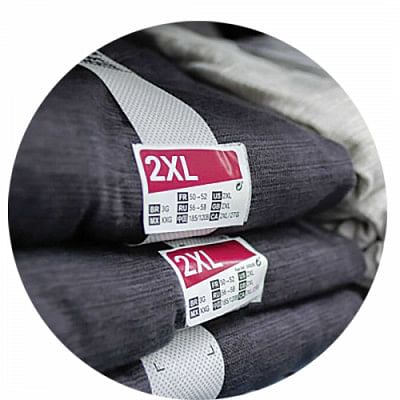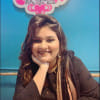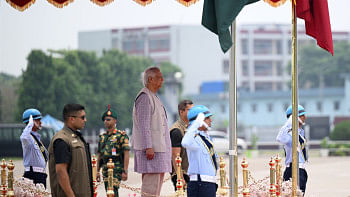Fashion That Fits

As a child who mindlessly consumed hours of television shows and movies for most of their pre-teen and teen years, I was under the impression that fashion (and everything good that comes with it) came with a size 0 to size 2 body. Add five kilograms to that, and you're looking at the slobby best friend who only either dresses like a grandma or wears bootlegger jeans with the ugliest T-shirts one could find.
I now understand why.
While most of us understand fashion to be a form of self-expression, it isn't always a choice for everyone. Most mainstream brands only offer certain sizes, while others – the more inclusive ones – only sell more fashionable fits and trends from the regular size XS (chest 32) to a size M (chest 38), and everything beyond that lacks shape, tasteful colours, fit or all of them.
In other words, if you're anything beyond the size M, you will likely only be offered a brightly coloured, loosely fitted and oddly shaped T-shirt, or fatua. That is if you even find something in that size.
In fashion, and in media, the trend is as follows. People from a size XS to a size M for women and a size S to a size L for men are the ones who dress to create the impression they want others to have about them, everyone past them dress with whatever fits them best.
In Bangladesh, the unspoken consensus is that fashion is only for people who fit the traditional beauty standards. If one is anything beyond the usual L size, and finds something they like, it will probably lead to a very reluctant salesperson telling you it's not available in your size. So, for such shoppers, the only option is to go for things that fit, not things they necessarily like.
Generally, availability is a big problem when it comes to finding inclusive size options in the Bangladeshi fashion Industry.
Tasnim Nishat Islam, a 23-year-old university student, says, "Growing up, I could only shop from certain stores because most mainstream boutiques and fashion houses didn't have the size I needed. Even then, I had to alter most of my dresses."
If, by chance, you manage to find clothes that fit you, you will likely have to compromise the design because even popular fashion houses like Aarong where you can find up to sizes 46-48, you will see not all designs available in all the sizes. Most designs are available up to sizes 42 or 44, but not beyond that.
The fashion industry also seems to lack versatility and an understanding of variety in body shapes. Most sizes offered are also non-uniform. There are size charts everywhere but have different measures that correspond to different labels.

As Tasnim mentions, "Even when something happens to be available in my size, some part of it will be an awkward fit because they just mindlessly increased the size without keeping a body shape in mind."
Twenty-two-year-old student Israt Jahan points out, "Even the umbrella term 'plus size' has its own categories. Most of the fashion houses don't go up to 3XL, 4XL or 5XL."
Despite the existing issues, some brands have already made a point of being more inclusive in the clothing they offer and the models they employ.
SHAPE, for example, is a women's intimate clothing brand that promises to provide innerwear that "caters to South Asian women, made to fit our shape, size (especially larger sizes) and style without compromising comfort." Not only do they deliver what they promise through their multiple size ranges but also actively promote body positivity through their online presence and representation.
When talking about her inspiration to design, Nusrat Mahmud Ananna, owner of the online clothing store Bold, says, "As a plus-size girl, I couldn't find the clothes I wanted in my size. The clothes available were boring and limited, although the regular sizes had many designs. So, I took the initiative to launch Bold, to make western clothes in larger sizes."
"Our idea is to complement people's bodies and not hide them. We allow people to customise their outfits and make them feel nice in their clothes. We featured real people wearing our clothing. And surprisingly, the response was very positive," says Ananna.
Another brand to mention would be Zeba by Nabela Noor, an influencer of Bangladeshi origin. She works to stand against labels and promote inclusivity through clothing available in larger sizes. She, and her brand by extension, believe in empowering through clothing, by introducing "a sizing system designed to empower," and have done so by chucking out the regular L, XL, and XXL labels that enforce toxic beauty and body standards in society.
However, as the body positivity movement is mostly women-centric and advocated by female influencers online, the plus-size fashion industry has in a way excluded men from the equation, even though they too find themselves in similar situations when it comes to clothing and fashion.
"I once went shopping with my family to a showroom of a renowned fashion brand in Dhaka. It was for Eid, I was excited, and when I picked out a pair of pants I sort of liked, the salesperson looked me up and down before telling me I wouldn't find anything of my size there. He was wrong because I had shopped there just months before and hadn't gotten bigger meanwhile, but the feeling left a mark. It was a long time before I went shopping for my own clothes again," recounts Taqdirul Islam*, a 24-year-old student.
Most shoppers agree that in the last few years, inclusive options have become more available. As unfortunate as it may be, online shopping has given many shoppers the comfort of finding what they need while avoiding prejudice and judging glances from store-owners and sales people.
A question of affordability still remains, as only high-end lines offer options for plus-size clothing.
Inclusivity in fashion is important, because everybody deserves a choice when it comes to self-expression. How people dress tells us a lot about how they want to be viewed and perceived. Weight or shape shouldn't be a measure of identity, the choice of expression should.
The point of fashion is not for us to fit into clothes, it is for us to find clothes that fit us.
*Name has been changed on request

 For all latest news, follow The Daily Star's Google News channel.
For all latest news, follow The Daily Star's Google News channel. 



Comments